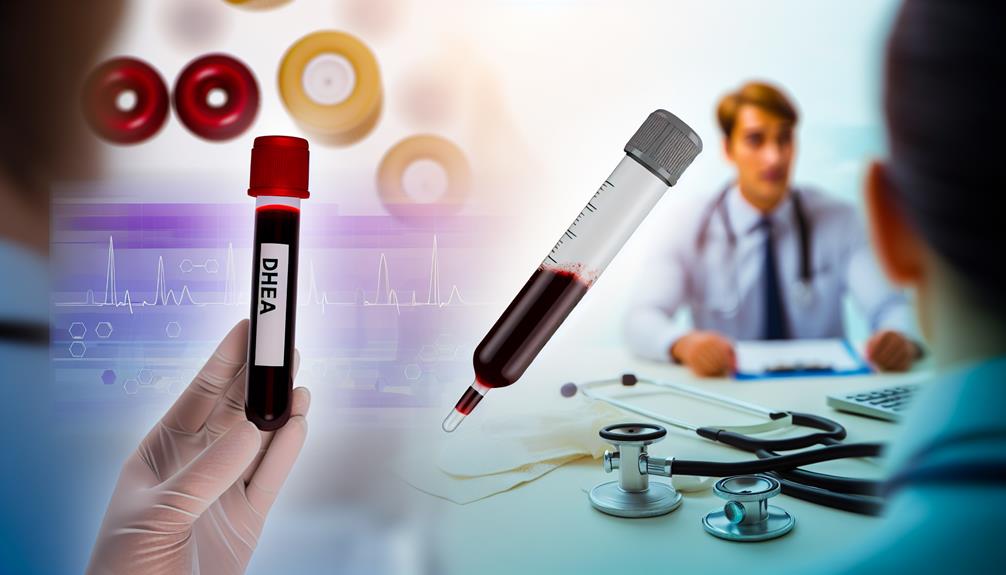Men should recognize that DHEA is essential for hormonal health. It's synthesized in the adrenal glands and acts as a precursor to testosterone. As we age, DHEA levels naturally decline, potentially disrupting hormonal balance and leading to fatigue or reduced libido. While DHEA supplements can help restore levels and improve well-being, they come with risks like hormonal imbalances and mood swings. Regular exercise, a healthy diet, and stress management can naturally boost DHEA. Monitoring DHEA levels through blood tests is advisable for informed decisions. There's much more to explore about optimizing DHEA and maintaining overall hormonal health.
Understanding DHEA

Understanding DHEA, or dehydroepiandrosterone, is essential for anyone looking to optimize hormonal health. As a fundamental precursor hormone, DHEA is synthesized primarily in the adrenal glands, and it plays an important role in the production of both testosterone and estrogen. This is key for maintaining a balanced hormonal environment, especially in men.
DHEA sources can be broadly categorized into endogenous and exogenous. Endogenously, DHEA levels peak in early adulthood and gradually decline with age, which can impact overall hormonal balance. Exogenous sources include dietary supplements, which are often marketed for various purported benefits, including improved energy and enhanced libido. However, it's essential to approach supplementation with caution, as the effects can vary widely among individuals.
The metabolism of DHEA is complex and involves conversion into other hormones through enzymatic processes. Enzymes such as 3β-hydroxysteroid dehydrogenase and aromatase play notable roles in this metabolic pathway. The balance of these enzymatic activities can determine how much DHEA is converted into testosterone or estrogen, which can greatly affect an individual's hormonal profile.
To better understand how DHEA levels impact your health, it's important to monitor not just DHEA itself, but also its metabolites. Hormonal assessments can provide insight into how DHEA metabolism may be influencing your overall well-being. By acknowledging the sources and metabolic pathways of DHEA, you can make informed decisions about managing your hormonal health more effectively.
Importance of Hormonal Balance
Maintaining hormonal balance is fundamental for overall health, particularly for men whose testosterone levels can be influenced by DHEA. Hormonal fluctuations are a natural part of life, but when they become significant, they can disrupt endocrine health and lead to various health issues. I've observed that many men underestimate the importance of this balance, often dismissing the subtle signs of hormonal instability.
Testosterone, which plays a significant role in muscle mass, mood regulation, and sexual health, can be affected by both high and low levels of DHEA. Research indicates that ideal levels of DHEA support the production of testosterone, thus promoting a healthier hormonal balance. When DHEA levels are low, testosterone production may decrease, leading to fatigue, reduced libido, and even depression. Conversely, excessively high levels of DHEA can also lead to elevated testosterone, which may result in aggressive behavior and other unwanted side effects.
Moreover, maintaining this balance isn't just about testosterone; it's about the intricate interplay of various hormones within the endocrine system. An imbalance can lead to metabolic disorders, weight gain, and an increased risk of chronic diseases. Consequently, it's essential for men to monitor their hormonal health through regular check-ups and, if necessary, consider lifestyle changes or supplementation to support DHEA levels. By prioritizing hormonal balance, I believe we can enhance our overall health and well-being.
How DHEA Affects Men

DHEA plays an essential role in testosterone production, which is important for maintaining various physiological functions in men. Additionally, I've observed that DHEA can have a significant impact on mood stability, potentially influencing overall mental health. Understanding these effects is fundamental for optimizing hormonal balance and well-being.
Role in Testosterone Production
Testosterone is an essential hormone for men's health, influencing everything from muscle mass to mood. One important aspect that I've learned is how DHEA (Dehydroepiandrosterone) plays a significant role in testosterone synthesis. DHEA is a precursor hormone, produced primarily in the adrenal glands, and it serves as a building block for testosterone.
Here's a concise overview of the relationship between DHEA and testosterone production:
| DHEA Sources | Mechanism of Action | Effect on Testosterone Levels |
|---|---|---|
| Adrenal glands | Converted to androgens | Increases testosterone synthesis |
| Supplements | Can boost DHEA levels | Potentially enhances testosterone |
| Diet (e.g., cholesterol-rich foods) | Supports DHEA production | May indirectly aid testosterone production |
| Exercise | Stimulates DHEA release | Promotes healthy testosterone levels |
| Aging | DHEA levels decline | Leads to decreased testosterone synthesis |
Impact on Mood Stability
Several studies indicate that hormonal balance plays an integral role in mood stability for men, particularly when it comes to DHEA levels. DHEA fluctuations can markedly influence emotional resilience and overall mental well-being. As a precursor to sex hormones, DHEA impacts neurotransmitter balance, which is vital for regulating mood and preventing mood disorders.
When DHEA levels are ideal, I find that my stress response is more effective, enabling me to cope with daily challenges. Conversely, diminished DHEA levels may lead to increased vulnerability to stress and mood instability. This connection underscores the importance of adrenal function, as the adrenal glands are responsible for DHEA production.
Maintaining hormonal regulation through lifestyle choices, such as diet and exercise, can help stabilize DHEA levels. This, in turn, may mitigate the risk of mood disorders and promote emotional stability. It's essential to monitor my hormonal health, as even minor imbalances can disrupt mental well-being. By understanding the effects of DHEA on mood stability, I can make informed decisions to support my overall health and enhance my emotional resilience.
Benefits of DHEA Supplementation
Exploring the benefits of DHEA supplementation reveals its potential to enhance hormonal balance and overall well-being in men. Dihydroepiandrosterone (DHEA) is a hormone naturally produced by the adrenal glands, and its levels peak in early adulthood before gradually declining with age. Research suggests that DHEA supplementation can help restore ideal levels, potentially improving various aspects of health.
One of the primary benefits of DHEA is its role in supporting testosterone production. A study published in the "Journal of Clinical Endocrinology & Metabolism" indicated that DHEA supplementation could increase testosterone levels in men, particularly those with low baseline levels. This could lead to improvements in muscle mass, strength, and libido.
Moreover, DHEA may contribute to enhanced mood and cognitive function. Evidence from clinical trials has shown that DHEA can reduce symptoms of depression and improve overall mood stability, likely due to its influence on neurotransmitter regulation.
When considering DHEA sources, supplementation is often the most practical approach, as dietary options are limited. DHEA supplements are available over-the-counter in various forms, including capsules and tablets. However, it's essential to consult with a healthcare professional before starting any supplementation regimen to determine the appropriate DHEA dosage tailored to individual needs, typically ranging from 25 mg to 50 mg daily for men.
Risks and Side Effects

While DHEA supplementation offers potential benefits, it's essential to be aware of the risks and side effects associated with its use. I've found that understanding these risks can help you make informed decisions about DHEA dosage and its long-term effects on your health.
One of the primary concerns with DHEA supplementation is hormonal imbalance. Elevated levels can lead to a variety of side effects, including acne, hair loss, and changes in libido. Additionally, there may be increased risks of mood swings and aggressive behavior.
Here's a summary of some potential risks and side effects:
| Risk/Side Effect | Description |
|---|---|
| Hormonal Imbalance | Changes in testosterone and estrogen levels |
| Acne and Skin Issues | Increased oil production leading to acne flare-ups |
| Mood Changes | Potential for increased irritability or aggression |
It's also important to reflect on the long-term effects of DHEA supplementation. Research indicates that prolonged use may have implications for heart health and could influence the risk of hormone-sensitive cancers. Consequently, I recommend consulting with a healthcare professional before starting DHEA, especially if you have pre-existing conditions or are taking other medications.
Natural Ways to Boost DHEA
After considering the risks and side effects of DHEA supplementation, you might be interested in exploring natural methods to enhance your body's DHEA levels. One of the most effective strategies involves making targeted lifestyle changes. Regular physical activity, particularly resistance training, has been shown to naturally elevate DHEA levels. Engaging in consistent exercise not only promotes overall hormonal balance but also enhances muscle mass, which is essential as we age.
In addition to exercise, incorporating specific dietary adjustments can greatly impact DHEA production. Foods rich in healthy fats, such as avocados, nuts, and olive oil, provide essential nutrients that support hormone synthesis. Omega-3 fatty acids, found in fish like salmon, are particularly beneficial. I've found that a balanced diet, low in processed sugars and high in whole foods, contributes to maintaining ideal hormone levels.
Moreover, managing stress is essential in this equation. Chronic stress can lead to elevated cortisol levels, which may suppress DHEA production. Mindfulness practices, such as meditation or yoga, can effectively lower stress and promote hormonal health. Adequate sleep is another pivotal factor; ensuring I get enough restorative sleep each night has been linked to better hormone regulation.
DHEA Testing and Levels

Understanding DHEA testing and levels is essential for anyone considering hormone health and supplementation. DHEA, or dehydroepiandrosterone, is a hormone produced by the adrenal glands, and its levels naturally decline with age. To assess your DHEA levels, a simple blood test can be performed, typically measuring DHEA sulfate (DHEA-S), the more stable form of the hormone. It's important to have this test conducted in the morning when levels are at their peak.
Ideal levels of DHEA can vary widely among individuals, influenced by factors like age, sex, and overall health. Generally, for men, the normal range of DHEA-S is between 280 to 640 micrograms per deciliter (mcg/dL) in younger adults, while levels in older adults tend to be lower. It's significant to remember that these ranges are not one-size-fits-all; what's ideal for you may differ based on personal health conditions and lifestyle.
If your DHEA levels are found to be low, it might indicate an underlying health issue, such as adrenal insufficiency or chronic stress. Conversely, elevated levels could suggest conditions like adrenal tumors or excessive supplementation. Regular DHEA testing can help monitor your hormonal health and guide decisions about supplementation. Keeping track of your levels over time can provide valuable insights into how your body is responding to lifestyle changes or treatments, ensuring you maintain hormonal balance effectively.
Consulting Healthcare Professionals
Consulting healthcare professionals is essential when maneuvering through changes in hormonal health, especially regarding DHEA levels. As a man experiencing hormonal fluctuations, I understand the significance of obtaining reliable healthcare guidance. DHEA supplementation is a complex topic that requires a tailored approach, and that's where professionals come in.
It's important to recognize the role of healthcare experts in traversing this landscape. They provide invaluable insights that can help us make informed decisions. Here are some key reasons to seek professional advice:
- Personalized assessment: Each individual's hormonal needs differ; professionals can tailor recommendations to your specific situation.
- Safety and efficacy: Understanding the potential risks and benefits of DHEA supplementation is essential; experts can guide safe usage.
- Monitoring progress: Regular follow-ups help track changes and adjust hormonal therapy as needed, ensuring ideal health outcomes.
- Patient education: Knowledge is power; healthcare professionals can equip you with the information necessary to understand your body and make informed choices.
Engaging with a healthcare professional not only demystifies DHEA supplementation but also supports a holistic approach to hormonal health. Their expertise in hormonal therapy can help mitigate potential side effects and enhance benefits. Remember, your health is paramount, and informed decisions lead to better outcomes. Don't hesitate to reach out to a qualified provider to discuss your concerns and explore your options together.
Frequently Asked Questions
Can DHEA Supplementation Affect Mental Health or Mood?
Taking DHEA is like tuning a fine instrument; it can greatly enhance mood regulation and mental clarity. From my experience, DHEA benefits include notable anxiety reduction and improved stress management, fostering emotional resilience. Research indicates that appropriate DHEA supplementation may lead to better mood stability, but it's essential to consult a healthcare professional to tailor the dosage. Balancing hormones can truly create a more harmonious state of mind, leading to overall well-being.
How Does Age Impact DHEA Levels in Men?
As I've learned, age considerably impacts DHEA levels in men. DHEA synthesis peaks in early adulthood, but I've noticed a clear age-related decline over the years. Research shows that by the time men reach their 30s and 40s, DHEA levels can drop substantially, which may affect energy, mood, and overall hormonal balance. It's important to understand this decline and consider how it might influence my health as I age.
Are There Specific Diets That Promote DHEA Production?
When it comes to promoting DHEA production, I've found that incorporating DHEA-rich foods into my diet can be beneficial. Foods like wild yams, avocados, and nuts are great choices. Additionally, I focus on optimizing nutrient absorption by including healthy fats and probiotics in my meals. This approach not only supports hormonal health but also enhances overall well-being. Maintaining a balanced diet rich in these nutrients has made a noticeable difference for me.
Can Exercise Influence DHEA Levels in Men?
Imagine your body as a finely-tuned orchestra, where each instrument plays an essential role in creating harmony. Exercise intensity can act as a conductor, prompting a symphony of hormonal balance. Research shows that engaging in moderate to high-intensity workouts can boost DHEA levels, enhancing overall hormonal health. However, too much intensity might disrupt this balance, much like a cacophony. It's important to find that sweet spot to optimize DHEA production effectively.
What Are the Signs of Low DHEA Levels?
I've learned that signs of low DHEA levels can manifest as fatigue, mood swings, and decreased motivation. These DHEA deficiency symptoms often overlap with other low hormone indicators, such as reduced libido or muscle weakness. It's essential to pay attention to these changes, as they can greatly impact overall well-being. If you're experiencing these symptoms, consider consulting a healthcare professional for a proper assessment and potential treatment options.
